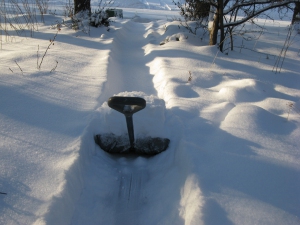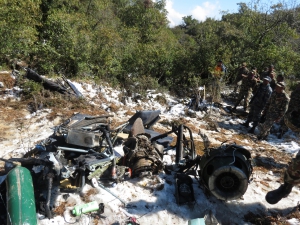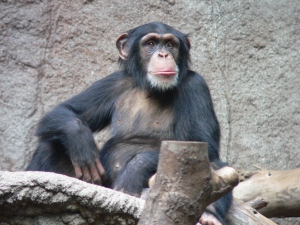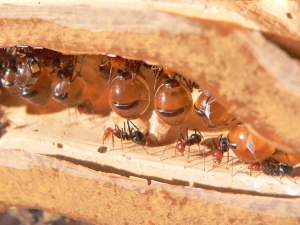
You can get quite hot doing this. There’s a very easy way to cool off. (Flickr)
I told a friend that I was working on an essay, and she made a guess about what the title was. I told her the real title and she replied, “Cuz everyone don’t wanna see a bare ass Will Matheson frolicking in the snow?”
Hard to argue with that.
I have another friend, who lives in rural Nova Scotia, who speaks to the elder incumbents frequently:
“If I have learned anything out here, it’s that older people in the country really hate if someone is being a dick to other people for no reason. ‘Why can’t people all just mind their own business? It’s like a disease that is spreading or something,’ says the good neighbour.”
Privacy is, at least in part, a protection from individual-society disagreement. This is why we have naturist habitats in secluded locations. This is why parties with alcohol in Iran happen on the downlow. This is why networks of drug production and distribution are kept secret. Yes, this is also why, say, botnet-running blackmailers stay in the shadows, too, but I think it’s important that we reflect on what, if anything, makes our purges special, aside from the fact that they’re ours.
For the many things that aren’t networks of baby theft, cooking, and meat distribution, we should consider privacy as a crude, temporary measure, but not necessarily a thing to attack. It is a queue into which we can place things to be reconciled with public life later. Ideally, it protects what is conscionable among a minority from the absolutist tyranny of the majority.1

Babies, Stove – These things should never never ever ever go together oh gawd I’m gonna get struck by lightning just for uploading this. (Wikipedia, Wikipedia)
The more society would drive a practice, benign or not-so-benign, underground, the more exacerbated the harmful effects become – provided, that is, there even are any. For example, young people might have a greater innate risk of alcohol poisoning, but their holding parties in secret must increase this risk. For one thing, few adults will subject themselves to the legal and social risks of monitoring such parties. For another, calling for an ambulance means everything is busted.2
And yet millions of teenagers go on drinking, with few or no lasting effects to speak of. You there – yes, you – did you drink when you were a teenager? For the love of crumbcake, tell the world! I didn’t drink when I was a teenager, but I didn’t hesitate to shame people who did. I regret the second thing. My objections were ungroundedly moral – it’s wrong because the Judeo-Christian-Dr. Laura morality corpus says it’s wrong, it’s wrong because alcohol is dangerous. I no longer care about the first, and in this essay I’m going to undermine the second as a reason to prohibit it, even though, really, alcohol is still dangerous.
In this and in all things, let’s not let the tragedies have exclusivity on our discourse. If all we knew about air travel were the crashes, few would ever fly.
Imagine a society where air travel is illegal. All you would ever hear about in public are 1) plane crashes and 2) busts of airplane-flying cartels and their passengers. The politicians will point at these and say “Look, another plane crash! Let’s tighten up the law – these criminals aren’t getting the message!”

It’s not just that this would be all that would get reported. This might be all that you know about. (Nepal Airlines Flight 183, crashed 16 February 2014)
In private, perhaps somebody will write about their air travel experience in the anonymous recesses of experienceproject.com. In public, the media won’t dare to touch it even with the paddle from Paul Bunyan’s canoe.
In real life, air travel is legal. We can bring all the resources of public society to bear on safety issues. We’ve made air travel the safest form, statistically. But if air travel were illegal for ill-grounded moral reasons, imagine the mess it would be, even if there were nothing innately wrong with air travel.
And even if plane travel were innately wrong, it doesn’t follow that it’s worth aggressively prosecuting or even formally prosecuting at all. You have to weigh the innate harms of the act against the extrinsic harms imposed by the legal regime you’re bringing to bear on it. In situations where the participants are not coerced and otherwise governed by not but nature, it might be better to leave well enough alone. Let’s take a deep breath and consider doing that.
Musicians have been willing to explore this ethic. You’re probably familiar with Pharrell’s popular piece, which has gotten people into trouble in Iran, so you know he must be on to something.
Here’s Sloan‘s crack at this:
I can picture privacy becoming a globally-sanctioned holding queue for practices that public society isn’t ready to acknowledge or engage with yet. I suppose such a system would be, though, a crude reaction to the excesses of authority and universalism. Maybe there is a future where we won’t need sophisticated privacy schemes, officially sanctioned or not. A privacy debate is a distraction: Making a fuss about privacy is a proxy battle fought by the forces of the fundamental conflict. Ideally, instead of fighting over privacy we could simply talk openly and push for the change and acceptance we need. If we can talk openly, we must, but there are certainly places and times where it is hazardous to your health to do so. Depending on the issue, here right now is one of those places and times.
In spite of the potential increase in extrinsic harms that comes with privacy, I think we need to foster a bit of an NOYB ethic for the sake of our own well-being. To subject everything to a monolithic public scrutiny is to continually put “shared” and individual values in mortal combat. To apply a value judgement universally and absolutely is tyrannical and will backfire, no matter how well-meaning you are. Even “don’t kill” is bullshit if your enemy is shooting at you and you have no way to merely disable them. As Sam Harris puts it, there are multiple peaks on the moral landscape. We shouldn’t care unduly about which peak we’re on. We just don’t want to be in the valleys, or put or confine other people in them.
It’s going to be impossible to get us all to agree on everything. This isn’t a bug; it’s a feature.

Common chimpanzee, Leipzig Zoo (Wikipedia)
We are equivalently related to two types of chimpanzee: The common chimpanzee and the bonobo. They are similar in form but quite different in behaviour. The bonobos live in a world where they have incredible, erm, “romantic freedom” and they’ve never been documented to purposefully kill each other, not even in captivity. The females cooperate to inhibit male aggression and a male’s status is derived from his mother. Common chimpanzees are more like us. They’re aggressively territorial and won’t scruple to kill outsiders and beat up on insiders. But food isn’t as plentiful for the common chimps as it is for the bonobos. Forcing the common chimps to wholly adopt the behaviour standards of the bonobos would be an affront to chimpanity.3
I feel that in this culture we’re faced with the plenty of the bonobos but we still behave like the chimpanzees because that’s a distressingly large part of how we got here. Going through agriculture made us less egalitarian (compared to hunter-gatherer groups, for example) and we even turned the rules of animal husbandry on ourselves, perhaps in spite of ourselves.4
It’s tempting to blame coercive belief systems and institutions for our strife, and I do this all the time, but I have to remind myself that they are human phenomena – they are us. If humans emerged from nature, they must be a subset of nature, so anything done by a human is natural by definition. It just might not harmonize with the rest of the body of nature.
It’s estimated that there are about 22,000 species of ant. And within each ant species, probably even the few that reproduce parthenogenetically (asexually, resulting in half- or full-clones), there are countless at-least-slightly distinct individual “societies”. They generally have some roles and rules in common, no doubt, but the diversity of ants reflects that the roles and rules that help ensure ant flourishing depend on where and when and in what you’d like the ants to flourish.
I think we should adopt a similar attitude with regards to humanity. Inasmuch as we would think it abhorrent to force all of the ants to follow the same rules, why would we think any differently when it comes to humans?
In a discussion I had with another friend last fall, I said maybe there should be exceptions, like not allowing human sacrifices, but he suggested that he’d be okay with that as long as the sacrifices were willing and – crucially – that the territory of such a culture be clearly demarcated.
At any rate, the key to human flourishing will probably not lie in forming a single mass-culture morass. If universals emerge, let them do so by their nature that makes them worth being universals. (Much blood has been shed by and on behalf of people who think they know better.) And not only does our diversity reflect our diverse requirements, but our diversity better preserves what it is to be human. Homogeneity across locales isn’t just environmentally impractical, it’s genetically dangerous. One disease – POW!5

Sign derived from the International Symbol of Access (Wikipedia)
I do want to have a few universal ideas. Not killing each other. No coerced mutilation. Free expression, thought, sexuality. No value-imperialism except to say no value-imperialism and the rest of this very short list. Don’t let the mere fact of race, gender, age, ability, mobility exclude someone. (Even visually-impaired people can participate in visual art.)
Anyway, for now – and possibly forever – I will fight on both fronts. I will push for privacy where public advocacy fails (and where I also I believe that the innate thing is valuable and necessary enough to justify assuming the extrinsic risks associated with the secrecy), and I will push for acceptance where privacy fails or is inadequate.
Acceptance is by far the better aim. It’s too much to demand forever hiding the fact that you’re inclined to engage in homosexual activity at some point. The proclamation of Trudeau 15, “There’s no place for the state in the bedrooms of the nation,” reflects a victory in the privacy-for-homosexuality proxy battle, not the winning of homosexuality acceptance. There might even be ways to get to acceptance that involve little or no enshrinement of privacy! It bears repeating that privacy is crude.

Liquor store in Breckenridge, Colorado (Wikipedia)
I wonder how much consumption patterns of alcohol (and other drugs, too6) are detrimentally impacted by the extrinsically necessary secrecy. This merits morally-neutral research, and I’m just one dude with a laptop, but for now, think about how many people learn to drink by binge drinking. Intuition suggests this kind of drinking pattern could persist beyond the teenage years.
Having a more relaxed attitude (and a relaxed legal regime that reflects this) would allow people to get into drinking gradually and carefully. The legal regime shouldn’t indulge the puritanical fantasy that the taste of liquor is unknown to the mouths of those underage™ and that the “WE WILL ID” messages on our NSLC paper bags are somehow protecting young people.
I would encourage us to extend an examinatory attitude to other age-based prohibitions, too. In the interest of not being shot, I won’t say which ones today. But here’s one I might keep: Mobility is a right. But driving is a privilege, similar in kind if not degree to how being eligible to perform surgery in hospitals is a privilege. It’s not necessarily dehumanizing to ask a 12-year-old to take the bus. However, if you have arguments to the contrary, I’m open to hearing them. When I was 12, I was in favour of special licensing for younger people – by which I mean, going younger than 16. Instead, the opposite happened: Graduated licensing was introduced. I was disgusted. It was also frustrating that the rules were being changed just before I was old enough to play. There are probably 12 year olds out there that can both drive and even be trusted with a car. But inasmuch as there is alternative mobility to driving a car, it’s not something I’m going to insist we open up.
If we institute some kind of legally-protected private space, people will ask what you’re going to use the privacy for. Maybe you’re going to use it for slavery – your home is your dungeon. People seem to be quite happy to slip in (and out) of these roles all the time. Slavery as a political system is a non-starter because we value liberty for everyone. But in the right context, the playing out of slavery can be consensual and fun. You’ll probably want a safe word.
This is the tricky thing: we have to bank on the better angels of human nature for this. If we give people privacy, we’re going to do it with the expectation that they don’t use it to become mail bombers.
Well, actually, there’s very little stopping you from becoming a mail bomber right now.
There’s also very little stopping you from taking your car out for a drive on the highway – on the wrong carriageway.
Yet you don’t do it.
Yet we have all the misery and fear as if there are potential threats around every corner.
We will never be able to eliminate all threats, and trying to do so may itself be a grave threat. The moral standpoint of “one is too many,” while appealing on its face (and even practical, provided the scope is small), may conceal an asymptotic challenge: You can work harder and harder and harder to eliminate all of something, but you won’t quite get there, and on the way to nowhere you might inflict more new misery than the misery caused by the thing you’re trying to stop. One murder is surely too many by definition, as murder means wrongful killing. But does “one is too many” justify all of the things we would have to do to ensure there would never be any murders? It may – it may not – it depends on what the proposed solution is. Among other things, how much it costs (not just in monetary terms), and what the side-effects are.
“I’ve got nothing to hide,” you might say. That’s great that you don’t! You are in an enviable position! Put yourself in another place or time, with what you know here and now, and odds are you would have quite a bit to hide. Now also consider that time travel is not the only way to come to have a value disconnection from the rest of your society.
I found the story of Montaigne to be inspiring in this regard, though I’ve yet to read his Essays myself. I’m going to try. Alain de Botton introduced me to Montaigne in his excellent book The Consolations of Philosophy. There’s also a miniseries called “Philosophy: A Guide to Happiness” that visits the same philosophers in the same order, with similar themes, though it’s best to read and view if you can. Here is the Montaigne segment; watch and learn about how he helps us confront our feelings of bodily, societal, and intellectual inadequacy:
A friend in high school did tell me, “You think you’re weird, but you’re not,” but of course I was so caught up in the public idea of my life that I had zero chance of realizing that then. I didn’t fully appreciate the distinction between difference and depravity.
Inasmuch as people cannot be said to be depraved merely by being out-of-bounds, given all of the conflicting bounds that have ever been, let’s help ourselves live with each other by being willing to experiment with privacy, if we can’t bring ourselves to experiment with truth.
But let’s experiment with truth if we can. Here is Ash Beckham talking about how we all have closets: we’re all hiding things. She speaks from her experience, “frozen by fear, curled up in the corner of my pitch black closet, clutching my gay grenade.”
The decision about whether to be closeted or open must be an individual one. Circumstances vary even among individuals in the same place and time – I happen to know one gay Muslim who doesn’t consider that to be a contradiction in terms, but it certainly doesn’t follow that all who think the same way must undertake the tremendous personal risks of setting up an Islamic World NAMMLA. (Depending on which country we’re talking about, a NAMBLA might be redundant.)
When it comes to the underlying issues that drive us to seek privacy, there’s reason to be encouraged, inasmuch as reason itself has a long reach. I go back to the above dialog frequently. It is inspiring how, for example, freedom for women was in part justified by freedom from slavery. Inasmuch as inconsistencies will continue to bother us, I believe there is hope.
“Men and nations behave wisely when they have exhausted all other resources.” – Abba Eban
Further viewing:
Glenn Greenwald’s TED talk, “Why Privacy Matters”:
Or, more likely, the tyranny of a para-religious minority that few have the gumption to openly question. But we also enable them by forcing fundamentalism on each other. ↩
Robby Soave writes about this at Reason.com as it applies to US colleges. The legal drinking age in the United States is an absurd 21. ↩
Here’s a quick summary of the differences between bonobos and common chimps. ↩
I’m not even scratching the surface here. As I say again and again, I recommend reading Sex at Dawn. ↩
For more on the mechanics of sex and diversity, check out Shadows of Forgotten Ancestors. It’s kind of an inner-space sequel to Cosmos. ↩
Boy, those darn teens! They “find a way” to smoke pot! ↩


